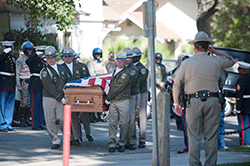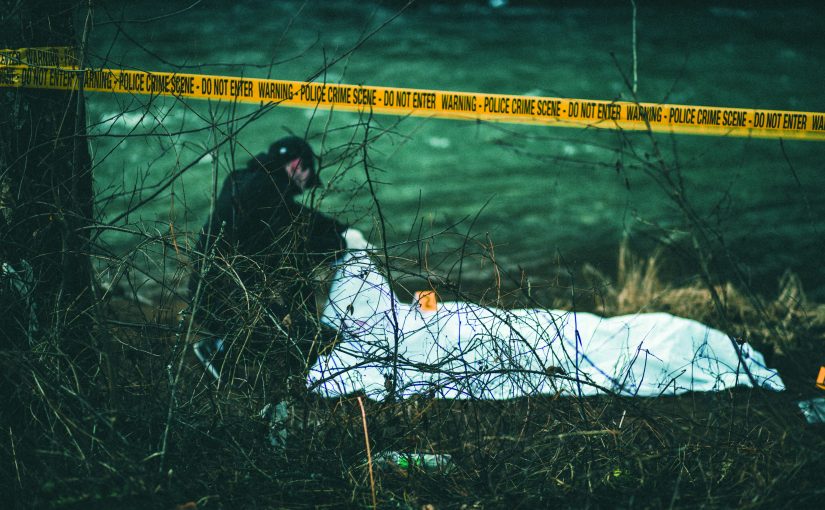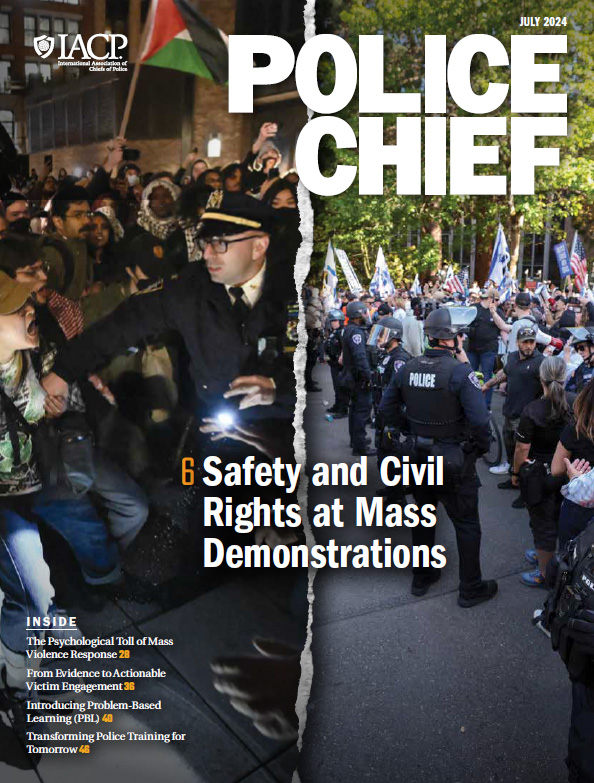Police officers are routinely exposed to death. In many instances, officers’ experiences with decedents include witnessing the intense emotional suffering of relatives of the deceased. Additionally, it is not uncommon for officers to lose fellow officers to on-duty deaths and permanent, career-ending injuries. Like everyone, police officers also have to cope with deaths of loved ones in their personal lives. This ongoing exposure to on- and off-duty deaths can significantly compromise officers’ wellness and health.
Overview of Grief
Death and loss are endemic to all living species. Each culture has its own rituals for mourning the deceased, and these rituals help those left behind adjust to a world without their loved ones. Indeed, it has been argued that the likelihood of being exposed to the loss of a loved one increases as one ages.1 In the scholarly literature, bereavement is defined as the painful experience of losing a loved one, and grief is defined as the psychophysiological symptoms one experiences after losing a loved one.2 Even though most research focuses on grief as a response to the loss of a loved one, other researchers found that individuals’ grief may be a common experience across different types of losses (e.g., losing a job, divorce).3 To use a biological analogy, bereavement can be thought of as a physical injury, while grief may be conceptualized as the painful inflammatory response to the injury. Grief manifests through symptoms such as strong yearning, longing, sadness, stress, and intrusive thoughts and images of the deceased.4
Researchers report that 10–15 percent of people who have lost a love one (most notably, a romantic partner or a child)—especially in the form of a sudden or violent death (e.g., accidents, homicide, suicide)—are at greater risk to develop prolonged grief.5 Other terms for this condition include pathological grief, unresolved grief, or complicated grief. Prolonged grief is a long-term condition that can interfere with a person’s ability to function, and it is characterized by an intense yearning for the deceased, emotional pain or emotional numbness, intrusive thoughts and memories of the deceased, a loss of trust, bitterness, hopelessness, and an emotional separation from one’s spiritual or religious belief system.6 Returning to the previous medical example, prolonged grief may be viewed as an infection to one’s wound.
Who is more at risk for prolonged grief? According to research, prolonged grief is more common in females, individuals who have a history of a mood disorder, and individuals who are pessimistic and were overly dependent on the deceased.7
Death and Loss in Police Work
Danger, either in a present or imminent form, is embedded in law enforcement. During their training, police officers are reminded that survival on the streets is paramount and that even routine incidents may escalate to potentially life-threatening ones. In addition, police equipment (e.g., body armor, firearms, tasers) and protective elements (e.g., bulletproof windows in police cruisers) serve as further reminders that officer or civilian safety may be jeopardized at any point; thus, preparedness for survival is crucial. To this end, law enforcement officers are sworn and mandated to respond to critical incidents whereas, during those situations, civilians escape or receive emergency workers’ help. A prime example of this can be seen in law enforcement officers’ heroic response to the terrorist attacks of 9/11: even though the officers knew the buildings could collapse at any moment, they remained on-site to save as many civilians as possible. Similarly, in active shooter situations, officers will attempt to stop the shooter and save civilians, even though they know that this may involve sacrificing their own lives.
It is broadly accepted that law enforcement officers respond to myriad critical incidents over the course of their careers, and their exposure to death-related situations may either be direct (e.g., shooting situations, dead body at a crime scene) or indirect (e.g., writing reports, participating in judicial procedures). Additionally, officers’ exposure to death or loss-related incidents may be prolonged due to various factors, such as news stories about the incident or having to testify at a subsequent trial. Furthermore, officers are frequently exposed to reminders that police work is death saturated; for instance, the entrance area of nearly every police precinct or academy contains a memorial featuring the images of officers who have sacrificed their lives in the line of duty. New York Police Department precincts that lost officers during the events of 9/11 have hung yellow ribbons in their entrances to commemorate these officers’ sacrifices, and other agencies might have similar symbols of loss at their headquarters or precinct offices.

In addition to encountering death on a regular basis on-duty, police officers, like everyone else, have to confront loss in their personal lives. Sometimes, this involves the death of a coworker from an illness or suicide, which blurs the line between professional and personal life. It is not uncommon, however, for police officers to tackle the emotional burden of grief from the loss of a loved one. Although some of these deaths follow protracted illnesses, in some cases, this loss occurs from an incident that is remarkably similar to events that the officers face on duty (e.g., a fatal traffic crash). In such instances, again, the separation between personal and professional life is extremely difficult to maintain, and officers find it difficult to grieve the loss of their loved one while attempting to continue working effectively. For example, one of the authors worked with an officer who contemplated retirement if his agency did not provide him with an alternative work assignment after the suicide of his 16-year-old daughter, because he was no longer emotionally able to work a patrol assignment where he routinely was called to the scene of suicides.
Beyond Traditional Grief
When the deaths accumulate on duty, without the corresponding emotional impacts of off-duty losses, police officers may be unable to experience traditional forms of grief. The deaths encountered on duty do not usually evoke the sort of bereavement one suffers following the loss of a loved one. Instead, these deaths contribute to other psychological reactions, which can significantly compromise officers’ wellness. These on-duty deaths fall into two categories. The first is when officers are called to the scene of a death in which the decedent reminds the officer of someone from their personal life. For example, one officer shared that his “heart stopped” when he responded to call in which a young child had drowned; as he entered the residence’s backyard, he saw the toddler wearing a swimsuit identical to his own son’s. Similarly, officers with teenage children often express how much more difficult it is to respond to traffic fatalities involving teenagers than it was before they had children of their own. Although officers do not generally experience grief in such situations, these death scenes literally hit too close to home and make it more difficult for officers to maintain appropriate emotional distance.
The second category of on-duty deaths are those that have no apparent personal connection to the officer. Although officers are trained to handle these deaths from an operational standpoint, the cumulative impact of repetitive exposure to death takes a toll emotionally and spiritually on many officers. This emotional and spiritual toll can cause officers to develop compassion fatigue. Compassion fatigue has been defined as the “cost of caring” that helping professionals often experience by supporting trauma victims.8 For officers motivated to help people, the continual after-the-fact responsibility of working the scene where a death has occurred leaves many officers feeling quite powerless. This can have a deleterious impact on officers’ spirituality and provoke an existential crisis, whereby officers lose their sense of purpose and meaning.9
The Impact of Prolonged Grief in Law Enforcement
Research shows that grief may impact law enforcement officers’ personal and professional lives in a number of ways. First, officers responding to violent crime scenes may feel negative emotions such as agitation and anger toward the perpetrators. This is especially salient when the victims are minors or elders, as the officer may identify them with his or her own vulnerable family members (e.g., children, parents). This association often causes officers to feel a very strong urge to act and do something to resolve the case.10 In other cases, officers who fail to save a civilian’s life may blame themselves or experience feelings of guilt as a result.

Research has also focused extensively on the experiences of officers who have lost a colleague in the line of duty. Not only does the loss of a partner force officers to confront their own mortality, but, for many, it is equally painful as the loss of a spouse.11 Moreover, officers who were present at the time of their partners’ deaths are also highly likely to suffer from survivor’s guilt.12 A number of other detrimental or negative behaviors have been documented among officers who have been exposed to death and loss in the line of duty, most notably alcohol abuse and suicidal ideation and behaviors. Indeed, researchers observed a significant increase in suicidal ideation and urgent care due to suicidal behaviors among officers who had responded to the terrorist attacks of 9/11.11
The extensive and comprehensive research surrounding grief and loss is also useful for understanding the challenges of death saturation in law enforcement. For instance, in one study, participants suffering from prolonged grief were less flexible with regard to enhancing or suppressing their emotions, which is a strong indication of emotional dysregulation.14 Similarly, other research found that individuals suffering from prolonged grief were prone to general attentional bias away from happy faces.15 In addition, other research has found that individuals suffering from prolonged grief are unable to express both positive and negative emotions and experience emotional dysregulation and disrupted emotional processes.16
In contrast, findings have shown that resilient individuals who experience the loss of a spouse tend to be emotionally stable and available to communicate with others, feel less lonely, and show greater capacity to experience comfort when recalling memories of the deceased.17 This last finding notwithstanding, the above body of research has significant implications for law enforcement professionals’ job performance, particularly considering the degree of emotional regulation required when interacting with civilians or attempting to de-escalate a potentially dangerous situation. Indeed, emotional dysregulation can impair officers’ decision-making abilities, which can have dire consequences in cases where the use of force may be required—to say nothing of the detrimental effects that emotional dysregulation can have on officers’ social relationships with their colleagues, family members, and friends.
Recommendations for Prevention and Action
The authors suggest that the following practices be considered by all law enforcement personnel to mitigate the negative effects of on- and off-duty deaths and loss:
■ Mindfulness practice offers a healthy way for law enforcement officers to process their reactions to death- or loss-related incidents, as it enables them to do so in a manner that is compassionate and nonjudgmental.18
■ Research has shown that visual imagery exercises provide similar benefits to mindfulness practices, as these exercises allow officers to feel present in a serene and safe zone.19 The implementation of these exercises is highly recommended, as prior research has demonstrated that they can help to improve officers’ performance.20
■ Gratitude letters can help to provide officers with an objective view of the positive impact their service has on their communities.21 In addition, practicing journaling allows officers to make meaning out of death- or loss-related situations experienced in the line of duty, which in turn provides them with the chance to process their maladaptive images and thoughts.22
■ Individuals should be encouraged to seek out professional assistance. Typically, a health professional will provide psychoeducation on what constitutes prolonged grief to the patient and why people grieve. Psychoeducation is a tool that has been proven to be quite effective. In providing officers with science-based knowledge, this approach helps to reassure them that their reactions to death- or loss-related situations are likely normal, which can help to mitigate self-imposed stigma associated with feelings of distress and sadness.23 In addition, psychoeducation can help officers and their families be more aware of when they should seek help, and what services to seek out.24
| Therapy for prolonged grief addresses seven core themes: (1) understanding and accepting grief, (2) managing painful emotions, (3) planning for a meaningful future, (4) strengthening ongoing relationships, (5) telling the story of the death, (6) learning to live with reminders, and (7) establishing an enduring connection with memories of the person who died. |
■ Officers should monitor their grief and take five to ten minutes at the end of each day to think back over the day and identify the times the grief was at its highest, rating it on a scale of 1 to 10 and noting what was happening at that time. Monitoring the days that are the highest for the week and lowest for the week can be useful, especially when discussed with a counselor/therapist.
■ Being on extended leave can actually impede recovery. The officer should be encouraged to reconnect with fellow officers.
■ The bereaved officer should seek out at least one person who can act as a confidant. Over time, the bereaved person should be encouraged to reengage in different social activities when they feel ready to do so.
■ Developing and engaging in some form of spiritual practice, for those so inclined, can provide an inoculating effect to help officers avoid a loss of purpose and meaning. Research has even found support for “the integration of workplace spirituality as a model that promotes community policing, police wellness, and the fostering of a guardian culture.”25
■ Many people living with prolonged grief believe they should avoid events, thoughts, people, places, and activities that remind them of their loss. These reminders should not be avoided. Although “bittersweet,” they hold benefits as well as pain. It is suggested that a ranked list of places and activities that have been avoided can be revisited, either alone or with a friend.
■ Resilience promotion should focus on targeted behaviors and individuals who are most likely to instill adaptation to death- or loss-related incidents.26 In addition, organizations should assess officers who appear to be at a higher risk of adverse outcomes from being exposed to death or loss in the line of duty and provide them with interventions tailored to their needs.
Closing Thoughts
Although the majority of police officers enter the profession with the desire to help people, their jobs regularly expose them to human tragedies. These situations may leave some officers in a perpetual state of powerlessness. Due to the increased risk of prolonged grief reactions in policing, it is important for police executives to recognize the problem and begin to provide more than post-incident resources. Police officers can benefit from psychoeducation and preventative measures that are designed to boost resilience. Although exposure to death and loss are inevitable for police officers, there is much that can be done to prevent prolonged grief reactions. 🛡
Notes:
1George A. Bonanno, Maren Westphal, and Anthony D. Mancini, “Loss, Trauma, and Resilience in Adulthood,” Annual Review of Gerontology and Geriatrics 32, no. 1 (February 1, 2012): 189–210.
2 M. Katherine Shear, “Grief and Mourning Gone Awry: Pathway and Course of Complicated Grief,” Dialogues in Clinical Neuroscience 14, no. 2 (June 2012): 119–128; M. Katherine Shear, “Complicated Grief,” New England Journal of Medicine 372, no. 2 (January 8, 2015): 153–160.
3 Anthony Papa, Nicole G. Lancaster, and Julie Kahler, “Commonalities in Grief Responding across Bereavement and Non-Bereavement Losses,” Journal of Affective Disorders 161 (June 2014): 136–143.
4 Shear, “Grief and Mourning Gone Awry”; Shear, “Complicated Grief.”
5 Laurie A. Burke and Robert A. Neimeyer, “Complicated Spiritual Grief I: Relation to Complicated Grief Symptomatology Following Violent Death Bereavement,” Death Studies 38, no. 4 (2014): 259–267; Shear, “Complicated Grief.”
6 Kathrin Boerner and Richard Schulz, “Caregiving, Bereavement and Complicated Grief,” Bereavement Care 28, no. 3 (December 2009): 10–13; Ashley B. Bullock and George A. Bonanno, “Attentional Bias and Complicated Grief: A Primed Dot-Probe Task with Emotional Faces,” Journal of Experimental Psychopathology 4, no. 2 (May 2013): 194–207; Burke and Neimeyer, “Complicated Spiritual Grief”; Fiona Maccallum, Matteo Malgaroli, and George A. Bonanno, “Networks of Loss: Relationships among Symptoms of Prolonged Grief Following Spousal and Parental Loss,” Journal of Abnormal Psychology 126, no. 5 (July 2017): 652–662.
7 M. Katherine Shear, Angela Ghesquiere, and Kim Glickman, “Bereavement and Complicated Grief,” Current Psychiatry Reports 15, no. 11 (November 2013): 406.
8 Charles R. Figley, ed., Compassion Fatigue: Coping with Secondary Traumatic Stress Disorder in Those Who Treat the Traumatized (New York, NY: Routledge, 1995).
9 Leah M Ferdelman, “Understanding How Existential Methods Can Help Police Officers Cope with Trauma,” ProQuest Dissertations and Theses, 2016; W. Patrick Sullivan and Vincent R. Starnino, “‘Staring into the Abyss’: Veterans’ Accounts of Moral Injuries and Spiritual Challenges,” Mental Health, Religion & Culture 22, no. 1 (May 2019): 25–40.
10 Laurence Miller, “Line-of-Duty Death: Psychological Treatment of Traumatic Bereavement in Law Enforcement,” International Journal of Emergency Mental Health 9, no. 1 (2007): 13–23.
11 Jennifer C. Gibbs, James Ruiz, and Sarah Anne Klapper-Lehman, “Police Officers Killed on Duty: Replicating and Extending a Unique Look at Officer Deaths,” International Journal of Police Science & Management 16, no. 4 (December 2014): 277–287.
12 Miller, “Line-of-Duty Death.”
13 John M. Violanti et al., “Proximity to the 9/11 Terrorist Attack and Suicide Ideation in Police Officers,” Traumatology 12, no. 3 (September 2006): 248–254.
14 Sumati Gupta and George A. Bonanno, “Complicated Grief and Deficits in Emotional Expressive Flexibility,” Journal of Abnormal Psychology 120, no. 3 (August 2011): 635–643.
15 Bullock and Bonanno, “Attentional Bias and Complicated Grief.”
16 Erica D. Diminich and George A. Bonanno, “Faces, Feelings, Words: Divergence across Channels of Emotional Responding in Complicated Grief,” Journal of Abnormal Psychology 123, no. 2 (May 2014): 350–361.
17 Anthony D. Mancini, Beyza Sinan, and George A. Bonanno, “Predictors of Prolonged Grief, Resilience, and Recovery among Bereaved Spouses,” Journal of Clinical Psychology 71, no. 12 (December 2015): 1245–1258.
18 Konstantinos Papazoglou, Peter Collins, and Brian Chopko, “Mindfulness and Officer Health, Job Performance, and Well-Being,” FBI Law Enforcement Bulletin, January 17, 2018; Brian A. Chopko, Konstantinos Papazoglou, and Robert C. Schwartz, “Mindfulness-Based Psychotherapy Approaches for First Responders: From Research to Clinical Practice,” American Journal of Psychotherapy 71, no. 2 (October 2018): 55–64.
19 Christiane Manzella and Konstantinos Papazoglou, “Training Police Trainees about Ways to Manage Trauma and Loss,” International Journal of Mental Health Promotion 16, no. 2 (April 2014): 103–116.
20 Judith P. Andersen et al., “Mental Preparedness as a Pathway to Police Resilience and Optimal Functioning in the Line of Duty,” International Journal of Emergency Mental Health and Human Resilience 17, no. 3 (2015): 624–627; Judith P. Andersen et al., “Applying Resilience Promotion Training Among Special Forces Police Officers,” SAGE Open 5, no. 2 (April-June 2015): 1–8.
21 Steven M. Toepfer and Kathleen Walker, “Letters of Gratitude: Improving Well-Being through Expressive Writing,” Journal of Writing Research 1, no. 3 (2009): 181–198.
22 Judith P. Andersen and Konstantinos Papazoglou, “Compassion Fatigue and Compassion Satisfaction among Police Officers: An Understudied Topic,” International Journal of Emergency Mental Health and Human Resilience 17, no. 3 (2015): 661–665.
23 Miller, “Line-of-Duty Death.”
24 Manzella and Papazoglou, “Training Police Trainees about Ways to Manage Trauma and Loss.”
25 Ramon Moran, “Workplace Spirituality in Law Enforcement: A Content Analysis of the Literature,” Journal of Management, Spirituality & Religion 14, no. 4 (September 2017): 358.
26 Bonanno, Westphal, and Mancini, “Loss, Trauma, and Resilience in Adulthood.”
Please cite as
Daniel M. Blumberg, Peter Collins, Konstantinos Papazoglou, Mike Schlosser, and George Bonanno, “Death and Loss in Police Work,” Police Chief Online, May 27, 2020.



